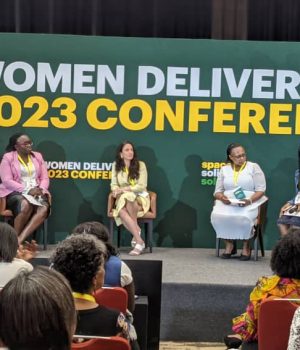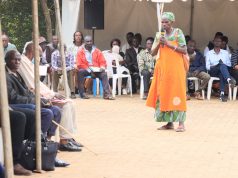As of July 17, 2023, over 6,000 delegates from around the world have gathered in Kigali to participate in the groundbreaking Women Deliver conference, the first of its kind on the African continent.
The majority of attendees are passionate gender equality and women’s rights activists, united in their commitment to fostering positive change and empowering women and girls worldwide.
During a compelling panel discussion titled “Breaking the Silence,” it was evident that a thriving community must openly address and tackle existing challenges across all aspects of human life, including health, among many others.
The discussion underscored that remaining silent can place vulnerable communities, especially women and adolescent girls with disabilities, in a state of uncertainty and hardship.
Stella, a young activist from Uganda, highlighted that adolescent, particularly those with disabilities, remain hidden within the community, lacking access to essential Sexual and Reproductive Health Rights (SRHR) such as contraceptives and Family Planning (FP) services.
She raised the pressing concern of continuous discussions on integration without tangible actions to address the issue.
“We have been talking about integration for so long, but when are we going to start acting?” She stressed.
Shonel Lunkuse, a passionate young activist from Uganda and one of the panelists, strongly advocates that Sexual and Reproductive Health Rights (SRHR) are interconnected with various aspects of life, drawing attention to climate change as an example.
She highlights that “climate change impacts people in multiple ways, leading to violations of SRHR, health rights, and economic rights. According to Lunkuse, SRHR lies at the core of all these challenges, permeating every aspect of our lives, necessitating collective action, education, and awareness-raising.”
Clive Mutunga, Director, USAID-funded BUILD Project being implemented by the African Institute for Development Policy (AFIDEP), the Pan African Climate Justice Alliance (PACJA), FHI360, Path Foundation Philippines, the Leadership for Development Africa, LEAD Malawi and Cote d’Ivoire (LEaD), said that people should show their activities so that can help others.
“I think as a community we need to be very stand first and regard in being able to demonstrate that through inaugurating our issues you can get other outcomes, one challenge that i would say for health sector we have not yet done already good job to demonstrate even not only for climate change, the all sectors never done already good job to assure the help benefits for other sectors wether is economic growth weither is resilience weither is education and rights, so it’s clearing call to show the evidences are closed very us as policy advocacy, weither is few base program see very creator implementation science research project that making that, we could do more by supporting that such activities, we need strong evidences to show that call section integration works and it benefits other sectors”.
Lunkuse, as an advocate, emphasizes that understanding how climate change affects marginalized groups is crucial to effectively empower them. The conference’s focus on integration has showcased comprehensive problem-solving approaches from various angles, and Lunkuse expresses hope that it will positively impact future actions.
Adolescent sexual and reproductive health rights remain a pressing and critical topic in today’s world. As young individuals with disabilities navigate the complexities of adolescence, it is crucial to understand and address their distinct sexual and reproductive health requirements.
Marie Louise Mukanyandwi
















